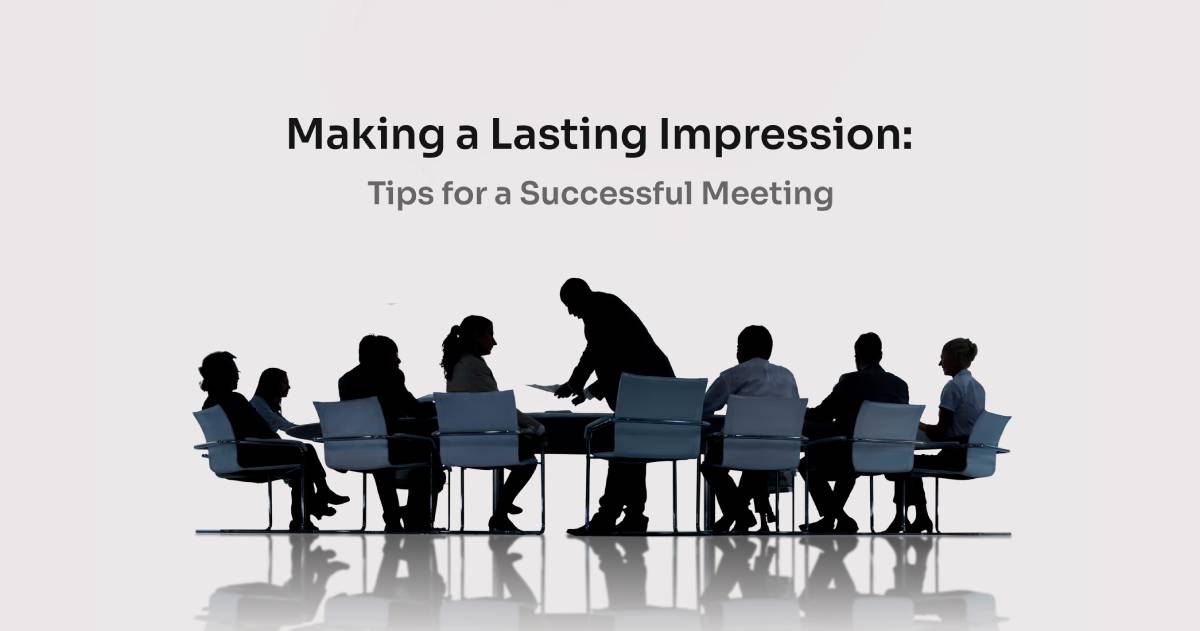Making a lasting impression during a meeting is essential for conveying professionalism, competence, and effective communication. Here are some tips to ensure a successful and memorable meeting:
1. Preparation is Key:
Before the meeting, ensure you understand the purpose, agenda, and desired outcomes. Research participants and topics, and gather relevant materials. Being well-prepared demonstrates your commitment and expertise.
2. Set Clear Objectives:
Communicate the goals of the meeting to all participants. Clear objectives help everyone stay focused and work towards a common purpose.
3. Be Punctual:
Arrive on time and start the meeting promptly. Being on time sets a professional tone and demonstrates respect for other people’s time.
4. Dress Appropriately:
Dress according to the meeting’s formality and the company culture. Your clothing should convey your professionalism and give you a self-assured feeling.
5. Engage with Eye Contact:
Maintain eye contact while speaking and listening. This demonstrates your attentiveness and engagement.
6. Confident Body Language:
Stand or sit up straight, use open gestures, and avoid crossing your arms. Confident body language projects credibility and authority.
7. Speak Clearly and Concisely:
Express your thoughts clearly and avoid rambling. Speak at a moderate pace, enunciate your words, and avoid using filler words.
8. Active Listening:
Show that you’re engaged by nodding, making appropriate facial expressions, and asking follow-up questions. Active listening fosters understanding and rapport.
9. Stay on Topic:
Stick to the agenda and avoid derailing the discussion with unrelated topics. This shows your respect for others’ time and the meeting’s purpose.
10. Encourage Participation:
Invite input from all attendees, including quieter participants. This fosters a collaborative atmosphere and diverse perspectives.
11. Use Visual Aids:
Visual aids like slides or documents can enhance understanding and retention. Keep visuals simple, relevant, and well-organized.
12. Manage Time Effectively:
Set aside time for each item on the agenda and keep to the timetable. Efficient time management demonstrates your organizational skills.
13. Address Concerns and Questions:
If there are concerns or questions, address them directly and professionally. This shows your commitment to resolving issues and promoting open communication.
14. Summarize Key Points:
Write down the main points and next steps for the meeting. This ensures everyone is on the same page and understands the next steps.
15. Follow Up:
Send a follow-up email that recaps the meeting’s outcomes, action items, and deadlines. This reinforces your commitment to moving forward and holding everyone accountable.
16. Express Gratitude:
Thank participants for their time and contributions. Gratitude leaves a positive impression and builds rapport.
17. Continuous Improvement:
Reflect on the meeting’s effectiveness and areas for improvement. Learning from each experience helps you refine your skills over time.
Remember that a successful meeting is a collaborative effort. Creating a positive, organized, and respectful environment benefits all participants and contributes to a lasting impression of your professionalism and leadership.

